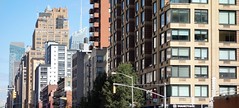On October 17, 2009, the Bay Area will remember the 20th anniversary of the Loma Prieta earthquake. By the numbers, the Loma Prieta was not something to sneeze at. Roughly 7.0 magnitude; 63 people killed; thousands injured; significant damage in places like the Marina District; and, of course, the silver lining: the collapse and ultimate removal of the Embarcadero Freeway, the Cypress Structure, and part of the Central Freeway. And yet, as we are often reminded, the Loma Prieta — which the U.S. Geological Survey has indicated was merely 6% as intense as the 1906 earthquake — will pale in comparison to the far more serious quake that will inevitably strike in the future. The Hayward Fault has not had a major earthquake since 1868, before the East Bay was densely populated, and both the Hayward and the San Andreas are due for major quakes. It hardly needs to be said that such a quake — whether located here in the Bay Area, or located just to the east of the Bay Area in the Delta, at the hub of California’s water conveyance system — will carry with it potentially profound destructive and disruptive capabilities. We will spare you repetition of the doomsday predictions that have already been offered (since we will probably get an earful of those throughout the next month), and instead simply encourage you to take simple steps now to prepare in advance.
 |
| Retrofitted properties, courtesy of EERI/base map Google. |
Readying the Bay Area so that it can bounce back, rebuild, and regenerate its economy after the next major earthquake will be a regional and multidisciplinary effort. An important part of the solution is clearly to strengthen existing buildings, to give them a fair shot of standing in the next quake, thereby saving lives. The race to complete retrofits has an unknown finish line — but it is a critical component of the effort to diminish the risk, extent, and severity of the damage that will occur to inhabitable structures and infrastructure in a major quake. And that raises an interesting question: just how much has been accomplished in the 20 years that have elapsed since the Loma Prieta? It’s estimated that thousands of structures around the region have already been and continue to be seismically retrofitted. Tracking down all those retrofit projects would be a Herculean effort for any single person. As a result, a complete catalog of such retrofits has proven elusive. But thanks to a community mapping project conceived by structural engineer David Bonowitz and sponsored by the Earthquake Engineering Research Institute (EERI) in Oakland, the general public now has at its fingertips a new source of information about seismic retrofits undertaken since 1989. The Bay Area Seismic Retrofit Map, which is developed by EERI and Northern California structural engineer volunteers, attempts to keep track of it all — everything ranging from modest residential structures to high-profile seismic retrofits of government buildings and transportation infrastructure. As the map is completed, it will become an increasingly valuable tool for determining trends; for studying the geographic distribution of retrofits that have occurred to date; and for encouraging people to fill in holes on the map, by taking advantage of incentives to retrofit their own homes. But the map is very much a work in progress, and filling it in is a collaborative effort. Anyone — be they an engineer, architect, government agency, or individual citizen — who was either involved in a retrofit project, or who knows about a project that is not yet charted on the map, is highly encouraged to contribute. Check it out.







The Community Mapping Project (of Bay Area Seismic Retrofits) link is interesting. The grouping of indicated projects in higher density areas is curiously efficient in creating potential life savings during an ‘event’. Is the current dispersion of retrofit projects the result of politician’s integrity, property owner’s altruism, or insurance company’s vision? Indeed: “… The race to complete retrofits has an unknown finish line …”.
Soon one for the map — apparently, the Dumbarton Bridge
..
Posted by QwkDrw | 18 September 2009, 10:41 am